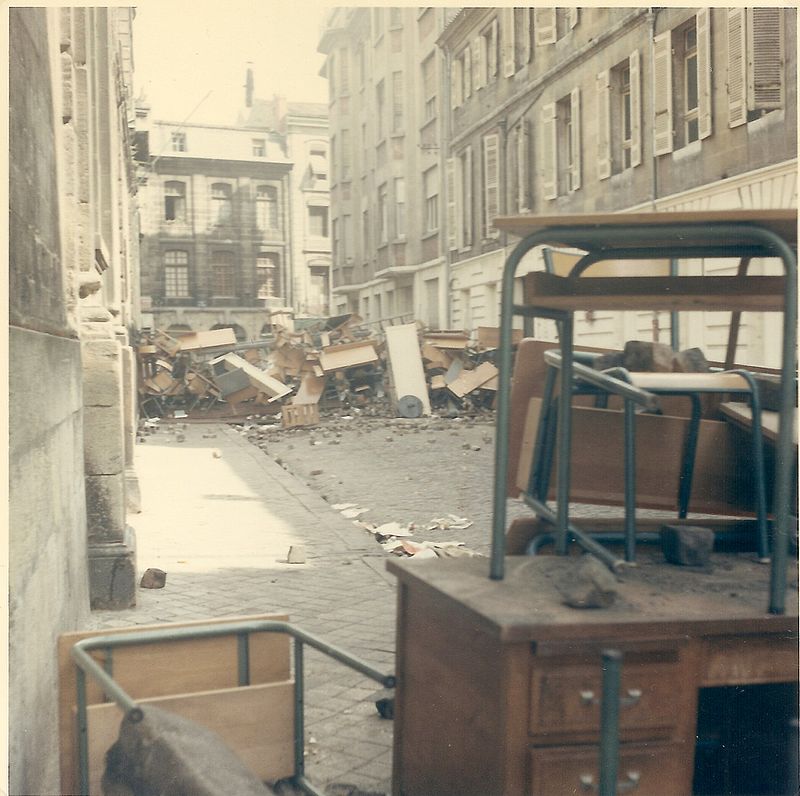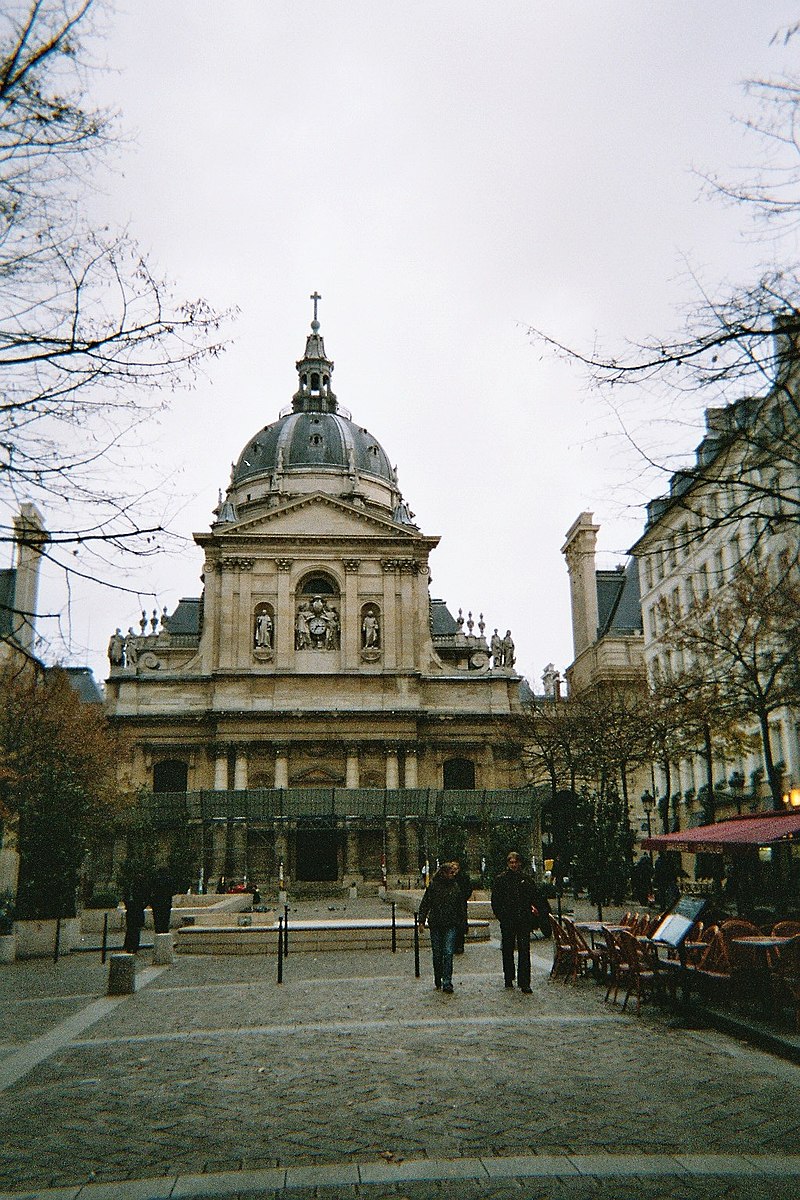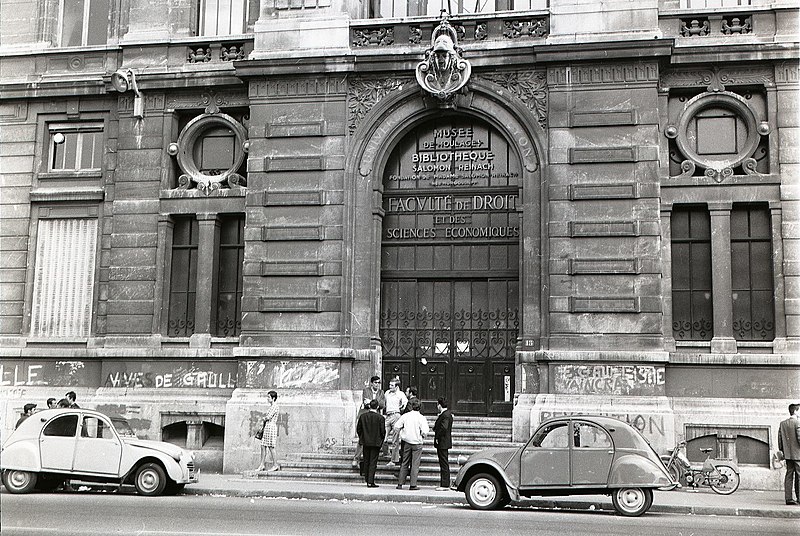May 68



Beginning in May1968, a period of civil unrest occurred throughout France, lasting some seven weeks and punctuated by demonstrations, general strikes, and the occupation of universities and factories. At the height of events, which have since become known as May 68, the economy of France came to a halt. The protests reached such a point that political leaders feared civil war or revolution; the national government briefly ceased to function after President Charles de Gaulle secretly fled France to Germany at one point. The protests spurred movements worldwide, with songs, imaginative graffiti, posters, and slogans.
The unrest began with a series of student occupation protests against capitalism, consumerism, American imperialism and traditional institutions. Heavy police repression of the protesters led France's trade union confederations to call for sympathy strikes, which spread far more quickly than expected to involve 11 million workers, more than 22% of the total population of France at the time. The movement was characterized by spontaneous and decentralized wildcat disposition; this created a contrast and at times even conflict internally amongst the trade unions and the parties of the left. It was the largest general strike ever attempted in France, and the first nationwide wildcat general strike.
The student occupations and general strikes initiated across France were met with forceful confrontation by university administrators and police. The de Gaulle administration's attempts to quell those strikes by police action only inflamed the situation further, leading to street battles with the police in the Latin Quarter, Paris.
Background
Political climate
In February 1968, the French Communists and French Socialists formed an electoral alliance. Communists had long supported Socialist candidates in elections, but in the "February Declaration" the two parties agreed to attempt to form a joint government to replace President Charles de Gaulle and his Gaullist Party.
University demonstration
On 22 March far-left groups, a small number of prominent poets and musicians, and 150 students occupied an administration building at Paris University at Nanterre and held a meeting in the university council room dealing with class discrimination in French society and the political bureaucracy that controlled the university's funding. The university's administration called the police, who surrounded the university. After the publication of their wishes, the students left the building without any trouble. After this first record some leaders of what was named the "Movement of 22 March" were called together by the disciplinary committee of the university.
Events of May
Student protests
Following months of conflicts between students and authorities at the Nanterre campus of the University of Paris (now Paris Nanterre University), the administration shut down the university on 2 May 1968. Students at the Sorbonne campus of the University of Paris (today Sorbonne University) in Paris met on 3 May to protest against the closure and the threatened expulsion of several students at Nanterre. On Monday, 6 May, the national student union, the Union Nationale des Étudiants de France (UNEF)—still the largest student union in France today—and the union of university teachers called a march to protest against the police invasion of Sorbonne. More than 20,000 students, teachers and supporters marched towards the Sorbonne, still sealed off by the police, who charged, wielding their batons, as soon as the marchers approached. While the crowd dispersed, some began to create barricades out of whatever was at hand, while others threw paving stones, forcing the police to retreat for a time. The police then responded with tear gas and charged the crowd again. Hundreds more students were arrested.
High school student unions spoke in support of the riots on 6 May. The next day, they joined the students, teachers and increasing numbers of young workers who gathered at the Arc de Triomphe to demand that:
1. All criminal charges against arrested students be dropped,
2. the police leave the university, and
3. the authorities reopen Nanterre and Sorbonne.

Escalating conflict
Negotiations broke down, and students returned to their campuses after a false report that the government had agreed to reopen them, only to discover the police still occupying the schools. This led to a near revolutionary fervor among the students.
On Friday, 10 May, another huge crowd congregated on the Rive Gauche. When the Compagnies Républicaines de Sécurité again blocked them from crossing the river, the crowd again threw up barricades, which the police then attacked at 2:15 in the morning after negotiations once again floundered. The confrontation, which produced hundreds of arrests and injuries, lasted until dawn of the following day. The events were broadcast on radio as they occurred and the aftermath was shown on television the following day. Allegations were made that the police had participated in the riots, through agents provocateurs, by burning cars and throwing Molotov cocktails.
The government's heavy-handed reaction brought on a wave of sympathy for the strikers. Many of the nation's more mainstream singers and poets joined after the police brutality came to light. American artists also began voicing support of the strikers. The major left union federations, the Confédération Générale du Travail (CGT) and the Force Ouvrière (CGT-FO), called a one-day general strike and demonstration for Monday, 13 May.
Well over a million people marched through Paris on that day; the police stayed largely out of sight. Prime Minister Georges Pompidou personally announced the release of the prisoners and the reopening of the Sorbonne. However, the surge of strikes did not recede. Instead, the protesters became even more active.
When the Sorbonne reopened, students occupied it and declared it an autonomous "people's university". Public opinion at first supported the students, but quickly turned against them after their leaders, invited to appear on national television, "behaved like irresponsible utopianists who wanted to destroy the 'consumer society". Nonetheless, in the weeks that followed, approximately 401 popular action committees were set up in Paris and elsewhere to take up grievances against the government and French society, including the Sorbonne Occupation Committee.


Worker strikes
By the middle of May, demonstrations extended to factories, though its workers' demands significantly varied from that of the students. A union-led general strike on 13 May included 200,000 in a march. The strikes spread to all sectors of the French economy, including state-owned jobs, manufacturing and service industries, management, and administration. Across France, students occupied university structures and up to one-third of the country's workforce was on strike.
These strikes were not led by the union movement; on the contrary, the CGT tried to contain this spontaneous outbreak of militancy by channeling it into a struggle for higher wages and other economic demands. Workers put forward a broader, more political and more radical agenda, demanding the ousting of the government and President de Gaulle and attempting, in some cases, to run their factories. When the trade union leadership negotiated a 35% increase in the minimum wage, a 7% wage increase for other workers, and half normal pay for the time on strike with the major employers' associations, the workers occupying their factories refused to return to work and jeered their union leaders. In fact, in the May 68 movement there was a lot of "anti-unionist euphoria", against the mainstream unions, the CGT, FO and CFDT, that were more willing to compromise with the powers that be than enact the will of the base.
On 24 May two people died at the hands of the out of control rioters. In Lyon, Police Inspector Rene Lacroix died when he was crushed by a driverless truck sent careering into police lines by rioters. In Paris, Phillipe Metherion, 26, was stabbed to death during an argument among demonstrators.
As the upheaval reached its apogee in late May, major trade unions met with employers' organizations and the French government to produce the Grenelle agreements, which would increase the minimum wage 35% and all salaries 10%, and granted employee protections and a shortened working day. The unions were forced to reject the agreement, based on opposition from their members, underscoring a disconnect in organizations that claimed to reflect working class interests.
The UNEF student union and CFDT trade union held a rally in the Charléty stadium with about 22,000 attendees. Its range of speakers reflected the divide between student and Communist factions. While the rally was held in the stadium partly for security, the insurrectionary messages of the speakers was dissonant with the relative amenities of the sports venue.

Calls for new government
The Socialists saw an opportunity to act as a compromise between de Gaulle and the Communists. On 28 May, François Mitterrand of the Federation of the Democratic and Socialist Left declared that "there is no more state" and stated that he was ready to form a new government. He had received a surprisingly high 45% of the vote in the 1965 presidential election. On 29 May, Pierre Mendès France also stated that he was ready to form a new government; unlike Mitterrand he was willing to include the Communists. Although the Socialists did not have the Communists' ability to form large street demonstrations, they had more than 20% of the country's support.
De Gaulle flees
On the morning of 29 May, de Gaulle postponed the meeting of the Council of Ministers scheduled for that day and secretly removed his personal papers from Élysée Palace. He told his son-in-law Alain de Boissieu, "I do not want to give them a chance to attack the Élysée. It would be regrettable if blood were shed in my personal defense. I have decided to leave: nobody attacks an empty palace." De Gaulle refused Pompidou's request that he dissolve the National Assembly as he believed that their party, the Gaullists, would lose the resulting election. At 11:00 am, he told Pompidou, "I am the past; you are the future; I embrace you".
The government announced that de Gaulle was going to his country home in Colombey-les-Deux-Églises before returning the next day, and rumors spread that he would prepare his resignation speech there. The presidential helicopter did not arrive in Colombey, however, and de Gaulle had told no one in the government where he was going. For more than six hours the world did not know where the French president was. The canceling of the ministerial meeting, and the president's mysterious disappearance, stunned the French,[9] including Pompidou, who shouted, "He has fled the country!".
Government collapse
With de Gaulle's closest advisors stating that they did not know what the president intended, Pompidou scheduled a tentative appearance on television at 8 p.m. The national government had effectively ceased to function. Édouard Balladur later wrote that as prime minister, Pompidou "by himself was the whole government" as most officials were "an incoherent group of confabulators" who believed that revolution would soon occur. A friend of the prime minister offered him a weapon, saying, "You will need it"; Pompidou advised him to go home. One official reportedly began burning documents, while another asked an aide how far they could flee by automobile should revolutionaries seize fuel supplies. Withdrawing money from banks became difficult, gasoline for private automobiles was unavailable, and some people tried to obtain private planes or fake national identity cards.
Pompidou unsuccessfully requested that military radar be used to follow de Gaulle's two helicopters, but soon learned that he had gone to the headquarters of the French military in Germany, in Baden-Baden, to meet General Jacques Massu. Massu persuaded the discouraged de Gaulle to return to France; now knowing that he had the military's support, de Gaulle rescheduled the meeting of the Council of Ministers for the next day, 30 May, and returned to Colombey by 6:00 pm. His wife Yvonne gave the family jewels to their son and daughter-in-law—who stayed in Baden for a few more days—for safekeeping, however, indicating that the de Gaulles still considered Germany a possible refuge. Massu kept as a state secret de Gaulle's loss of confidence until others disclosed it in 1982; until then most observers believed that his disappearance was intended to remind the French people of what they might lose. Although the disappearance was real and not intended as motivation, it indeed had such an effect on France.
Revolution prevented
On 30 May, 400,000 to 500,000 protesters (many more than the 50,000 the police were expecting) led by the CGT marched through Paris, chanting: "Adieu, de Gaulle!" ("Farewell, de Gaulle!"). Maurice Grimaud, head of the Paris police, played a key role in avoiding revolution by both speaking to and spying on the revolutionaries, and by carefully avoiding the use of force. While Communist leaders later denied that they had planned an armed uprising, and extreme militants only comprised 2% of the populace, they had overestimated de Gaulle's strength as shown by his escape to Germany. (One scholar, otherwise skeptical of the French Communists' willingness to maintain democracy after forming a government, has claimed that the "moderate, nonviolent and essentially antirevolutionary" Communists opposed revolution because they sincerely believed that the party must come to power through legal elections, not armed conflict that might provoke harsh repression from political opponents).
Not knowing that the Communists did not intend to seize power, officials prepared to position police forces at the Élysée with orders to shoot if necessary. That it did not also guard Paris City Hall despite reports of that being the Communists' target was evidence of governmental chaos. The Communist movement was largely centered around the Paris metropolitan area, and not elsewhere. Had the rebellion occupied key public buildings in Paris, the government would have had to use force to retake them. The resulting casualties could have incited a revolution, with the military moving from the provinces to retake Paris as in 1871. Minister of Defence Pierre Messmer and Chief of the Defence Staff Michel Fourquet prepared for such an action, and Pompidou had ordered tanks to Issy-les-Moulineaux. While the military was free of revolutionary sentiment, using an army mostly of conscripts the same age as the revolutionaries would have been very dangerous for the government. A survey taken immediately after the crisis found that 20% of Frenchmen would have supported a revolution, 23% would have opposed it, and 57% would have avoided physical participation in the conflict. 33% would have fought a military intervention, while only 5% would have supported it and a majority of the country would have avoided any action.
Election called
At 2:30 p.m. on 30 May, Pompidou persuaded de Gaulle to dissolve the National Assembly and call a new election by threatening to resign. At 4:30 pm, de Gaulle broadcast his own refusal to resign. He announced an election, scheduled for 23 June, and ordered workers to return to work, threatening to institute a state of emergency if they did not. The government had leaked to the media that the army was outside Paris. Immediately after the speech, about 800,000 supporters marched through the Champs-Élysées waving the national flag; the Gaullists had planned the rally for several days, which attracted a crowd of diverse ages, occupations, and politics. The Communists agreed to the election, and the threat of revolution was over.
Aftermath
Protest suppression and elections
From that point, the revolutionary feeling of the students and workers faded away. Workers gradually returned to work or were ousted from their plants by the police. The national student union called off street demonstrations. The government banned a number of leftist organizations. The police retook the Sorbonne on 16 June. Contrary to de Gaulle's fears, his party won the greatest victory in French parliamentary history in the legislative election held in June, taking 353 of 486 seats versus the Communists' 34 and the Socialists' 57. The February Declaration and its promise to include Communists in government likely hurt the Socialists in the election. Their opponents cited the example of the Czechoslovak National Front government of 1945, which led to a Communist takeover of the country in 1948. Socialist voters were divided; in a February 1968 survey a majority had favored allying with the Communists, but 44% believed that Communists would attempt to seize power once in government. (30% of Communist voters agreed).
On Bastille Day, there were resurgent street demonstrations in the Latin Quarter, led by socialist students, leftists and communists wearing red arm-bands and anarchists wearing black arm-bands. The Paris police and the Compagnies Républicaines de Sécurité harshly responded starting around 10 pm and continuing through the night, on the streets, in police vans, at police stations, and in hospitals where many wounded were taken. There was, as a result, much bloodshed among students and tourists there for the evening's festivities. No charges were filed against police or demonstrators, but the governments of Britain and West Germany filed formal protests, including for the indecent assault of two English schoolgirls by police in a police station.
National feelings
Despite the size of de Gaulle's triumph, it was not a personal one. The post-crisis survey showed that a majority of the country saw de Gaulle as too old, too self-centered, too authoritarian, too conservative, and too anti-American. As the April 1969 referendum would show, the country was ready for "Gaullism without de Gaulle".
Legacy
May 1968 is an important reference point in French politics, representing for some the possibility of liberation and for others the dangers of anarchy. For some, May 1968 meant the end of traditional collective action and the beginning of a new era to be dominated mainly by the so-called new social movements.
Someone who took part in or supported this period of unrest is referred to as soixante-huitard (literally a "68-er") — a term, derived from the French for "68", which has also entered the English language.













0 comments
Sign in or create a free account